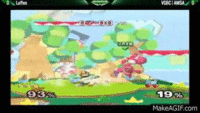Parry (Yoshi)
- For other meanings of "parry", see Parry (disambiguation).

Parrying refers to a variety of Yoshi-specific techniques that involve the use of counterattacking against opponents via his unique shield and double jump properties. These techniques vary from game to game, though they are most effective in the original Super Smash Bros. and Super Smash Bros. Melee.
In Smash 64
In Smash 64, Yoshi can deflect any attack by parrying. To perform this, the shield button must be pressed 4 or fewer frames before Yoshi is hit. The window is very small, as the shield button must be pressed for a maximum of 3 frames, otherwise it will fail. The extreme difficulty of performing this technique to avoid attacks consistently makes it rarely seen in competitive play, though players such as tacos and SheerMadness are known for their use of it.
In Melee
In Melee, Yoshi's light shield has a unique ability. If hit by an attack whilst light shielding, Yoshi will slide away a very far distance (grabbing an edge if he slides offstage). This is a useful technique as it renders the opponent unable to pressure or punish Yoshi, which they would normally be able to do since Yoshi's rolls are slow and short-distanced.
Additionally, Yoshi has a property in which if he powershields one move, he can immediately powershield another move that connects right afterward by continuously light shielding. If this is done against a move that has multiple hits, the shield eventually turns white due to the multiple powershields.
Finally, Yoshi's shield also has the unique ability to parry. To perform this, the shield button must be pressed 5 or fewer frames before Yoshi is hit. Yoshi is also able to jump out of shield during the first 6 frames of his shieding animation. Combining this with Yoshi's ability to "quick-hop", Yoshi can become actionable as fast as 7 frames after parrying.
During the first 6 frames of Yoshi's shielding animation he's fully invincible, from frames 3-6 a large powershield hurtbox appears around Yoshi's body; this means that during these frames only Yoshi's head hurtbox can successfully parry hits. Yoshi's head receeds into the shield more during frames 3-6. Allowing the shield to be hit will lock Yoshi out of jump-canceling the shield.
Crouching beforehand makes it easier to parry in some cases.
The shield button must be fully depressed to parry.
In all games
In Smash 64, Melee, Super Smash Bros. Brawl, Super Smash Bros. 4 and Super Smash Bros. Ultimate, Yoshi can also counterattack opponents using the unique properties of his double jump. Due to the armor properties of his double jump, Yoshi can avoid flinching against aerial attacks and perform any aerial after. This is referred to as a double jump cancel counter. While Yoshi would normally jump away and be unable to punish the opponent in time, the double jump cancel technique allows him to immediately use an aerial against the opponent in Smash 64 and Melee. For this reason, the technique is much more limited in Brawl, Smash 4 and Ultimate, as Yoshi is unable to double jump cancel in those games.
Gallery
Yoshi using a parry to deflect Pikachu's Thunder. Due to the ending lag of Thunder, Yoshi is able to throw out an attack far before Pikachu can react in this situation.
Yoshi performing a double jump cancel counter.



